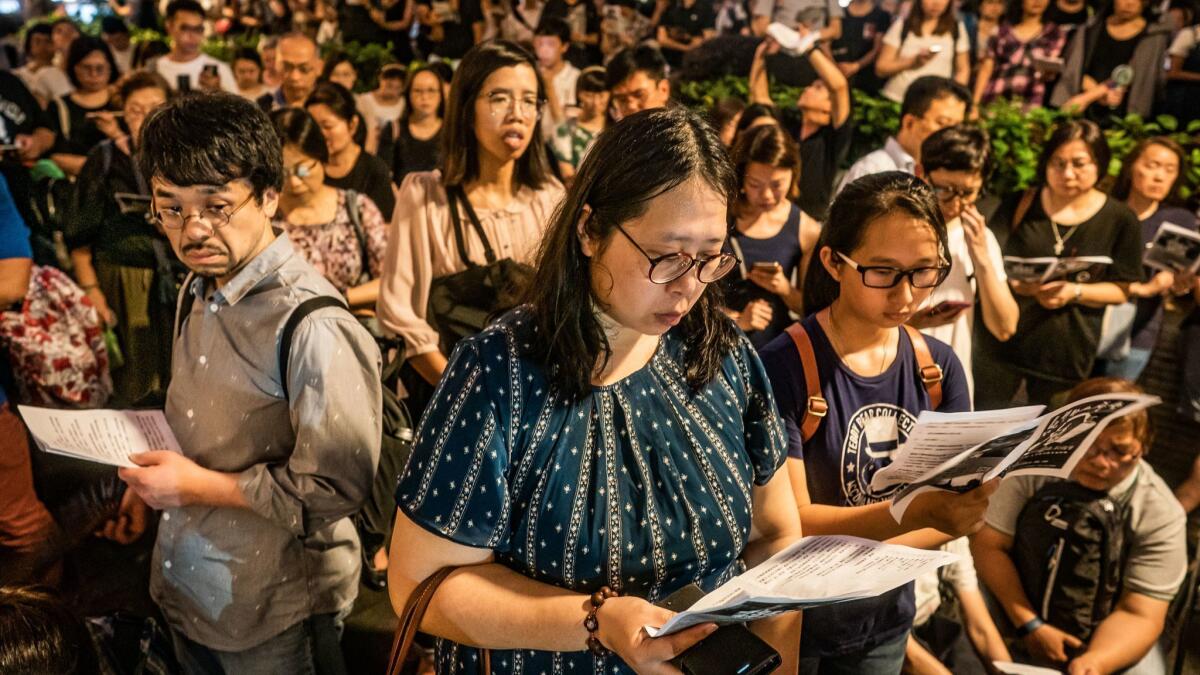How an obscure Taiwan murder case led to Hong Kong’s mega-protests

- Share via
Reporting from TAIPEI, Taiwan — More than a year ago on the outskirts of Taipei, Taiwan’s capital, a woman’s decomposed body turned up in a grassy thicket near a riverside recreation area popular with tourists.
The 21-year-old Hong Kong woman had been visiting Taiwan, according to a Taipei police report. A male friend, also from Hong Kong, is suspected of strangling her during a Valentine’s Day trip, a police official said Wednesday.
The suspect, Chan Tong-kai, 20, returned to Hong Kong four days after the possible murder — as if nothing had happened — before Taiwan police could investigate a cause of death.
“Not too many people knew about it, and I don’t think this case attracted a lot of attention,” said Nathan Liu, an international affairs professor at Ming Chuan University in Taiwan. He read about it in newspapers just this month.
Now the case is getting noticed because it catalyzed a bill in Hong Kong that sparked a series of street protests this month involving more than a million people in the former British colony. Hong Kong officials say the Taiwan case exposed a legal loophole that the bill would close. It’s also exposing political Taiwan-China barriers that may keep the case from being resolved.
The bill would let Hong Kong sign extradition deals with other governments. Other governments could in turn prosecute Hong Kong people suspected of crimes on their soil after extradition. Protesters fear Hong Kong suspects would land in China for political reasons and get stuck in an opaque legal system in which the death penalty is legal.
Taiwanese officials as high as President Tsai Ing-wen have openly backed the Hong Kong protests that began June 6 and crested at as many as 2 million people Sunday. Hong Kong Chief Executive Carrie Lam suspended the bill over the weekend.
Like the protesters, Taiwanese officials oppose control by the communist government in Beijing. China has ruled Hong Kong since 1997 with a degree of local autonomy that protesters fear the extradition law would erode. China claims self-ruled Taiwan as its territory and has threatened the use of force, if necessary, to take control of the democratic island someday.
“The people of Taiwan share your values and struggle,” Taiwanese Foreign Minister Joseph Wu tweeted to the protesters Sunday. “Our paths and destinies are linked as we both live under the shadow of the Chinese Communist Party regime.”
The president is playing to the sentiment of common Taiwanese, Liu said. Tsai will run for reelection in January 2020, possibly against a candidate who is friendlier toward Beijing. A government survey found in January that more than 80% of Taiwanese people oppose unification with China.
Taiwan’s government would refuse to sign an extradition deal with Hong Kong if asked, Cabinet spokeswoman Kolas Yotaka said Wednesday. A deal could include pro-Beijing language implying that the two sides both belong to China, which goes against the Taiwanese government’s stance that the island is autonomous.
A National Police Agency spokesperson said last year’s case is now considered “political.”
“We won’t sign, because Hong Kong’s extradition law hurts Taiwan sovereignty,” Yotaka said.
Because of the historical China-Taiwan political friction, neither Hong Kong nor China as a whole has diplomatic relations with Taipei. Formal relations often smooth extraditions.
If Hong Kong and Taiwan signed a deal, mainland China might make Hong Kong send the suspect its way instead of to Taiwan, ruling party lawmaker Lee Chun-yi in Taipei said. That move would cast China as an authority over Taiwan, consistent with Beijing’s view that the two sides should fall under one flag.
Since 2017, China has asked third countries multiple times to extradite Taiwanese citizens to its territory for fraud prosecution, and those countries normally comply — over Taiwan’s protests.
“If the crime is committed in Taiwan, then in principle it should be tried here,” Lee said. “If it were sent to China, that would be really strange.”
The suspect and his friend, Poon Hiu-wing, were staying in a central Taipei hotel on Feb. 13, 2018, the police report shows. Hong Kong news outlets say the couple had argued before she died that night, possibly about their spending and whether she was pregnant with Chan’s baby or someone else’s.
The body turned up in the thicket 15 metro stations away from the one nearest the hotel.
Poon’s father got the investigation started by contacting Hong Kong police after Chan returned without Poon, the police report in Taipei says. Hotel video shows Chan checking out alone that day, it says. Taiwan’s Criminal Investigation Bureau called counterparts in Hong Kong about interviewing Chan, who confessed to killing Poon, discarding her body and dumping the suitcase used to carry her out, according to the report.
Chan received a 29-month sentence for money laundering in April in Hong Kong for stealing Poon’s assets, including about $2,500 in cash, media in the Chinese territory say, but Hong Kong lacks jurisdiction to try him for murder.
Without accepting Hong Kong’s criminal suspects, Taiwan risks attracting more people who expect to avoid prosecution back home, said Liao You-lu, a criminal investigation professor at Central Police University in Taiwan. Drug sellers already come in from Hong Kong because they won’t face prosecution, Liao said.
“If this case is not settled, then it shows people can escape back to Hong Kong and get away with it,” he said. “If this case were about only Taiwan and Hong Kong, then it’s quite simple, but once mainland China gets involved, it gets more complicated.”
Jennings is a special correspondent.
More to Read
Sign up for Essential California
The most important California stories and recommendations in your inbox every morning.
You may occasionally receive promotional content from the Los Angeles Times.













